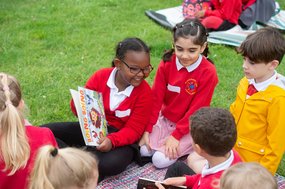
This report is based on 76,131 responses to our Annual Literacy Survey from children and young people aged 5 to 18 in early 2024. It includes findings on reading enjoyment, frequency and motivation and explores responses by age, gender, socio-economic background and geographical region.
Our surveys show that the number of children and young people who say they enjoy reading, and read daily, in their free time continues to decline.
Key findings
Reading enjoyment:
In 2024, the percentage of children and young people who told us they enjoyed reading was its lowest since we started asking about this in 2005.
- Just 1 in 3 (34.6%) children and young people aged 8 to 18 said that they enjoyed reading in their free time in 2024. Reading enjoyment levels have decreased by 8.8 percentage points over the past year alone.
- Slightly more children and young people aged 8 to 18 said that they enjoyed reading at school (40.5%) than in their free time (34.6%).
Reading frequency:
- Only 1 in 5 (20.5%) 8- to 18-year-olds told us that they read something daily in their free time in 2024, again, the lowest levels we've recorded since 2005, with daily reading levels decreasing by 7.5pp in the last year alone.
The link with reading skill (8 to 14s only)
In 2024, we were able to match survey and reading-skill (Star Reading) data for 3,861 children and young people aged 8 to 14. This allowed us to show that in terms of reading enjoyment:
- Children and young people who enjoyed reading (n = 1,211; M = 109.13) had higher average (mean) standardised reading scores than children and young people who didn’t enjoy reading (n = 2,593; M = 102.65). This difference was statistically significant.
We also found similar relationships with daily reading:
- Children and young people who read daily (n = 789; M = 109.49) had higher average (mean) standardised reading scores than children and young people who didn’t read daily (n = 3,026; M = 103.35). This difference was statistically significant.
Given the broad educational and socioeconomic factors known to influence children and young people’s enjoyment of reading, the National Literacy Trust is calling on the government to urgently form a reading taskforce and action plan with multi-sector partners to address declining rates of reading enjoyment and, in its curriculum and assessment review, prioritise reading for pleasure alongside the skills that are vital in the development of confident, motivated readers.
So much work is already being done across all corners of society from authors, educators, influencers and families, to schools, libraries, charities, publishers, businesses and government - but we recognise that we need to work together to make reading for pleasure a national priority.